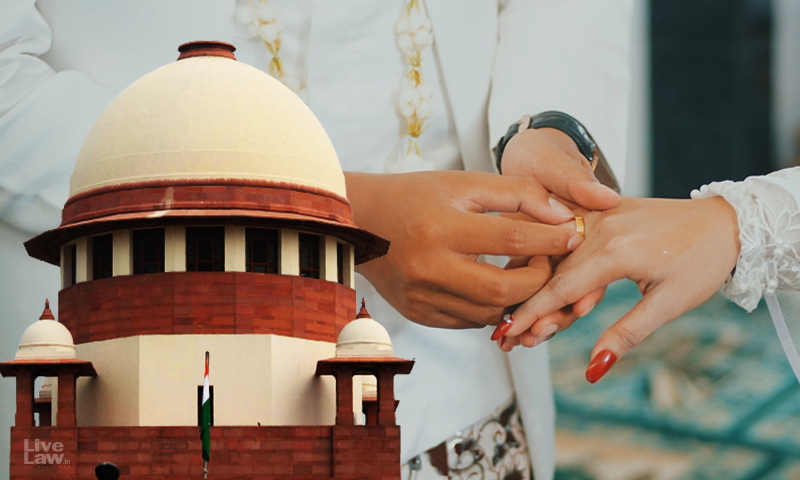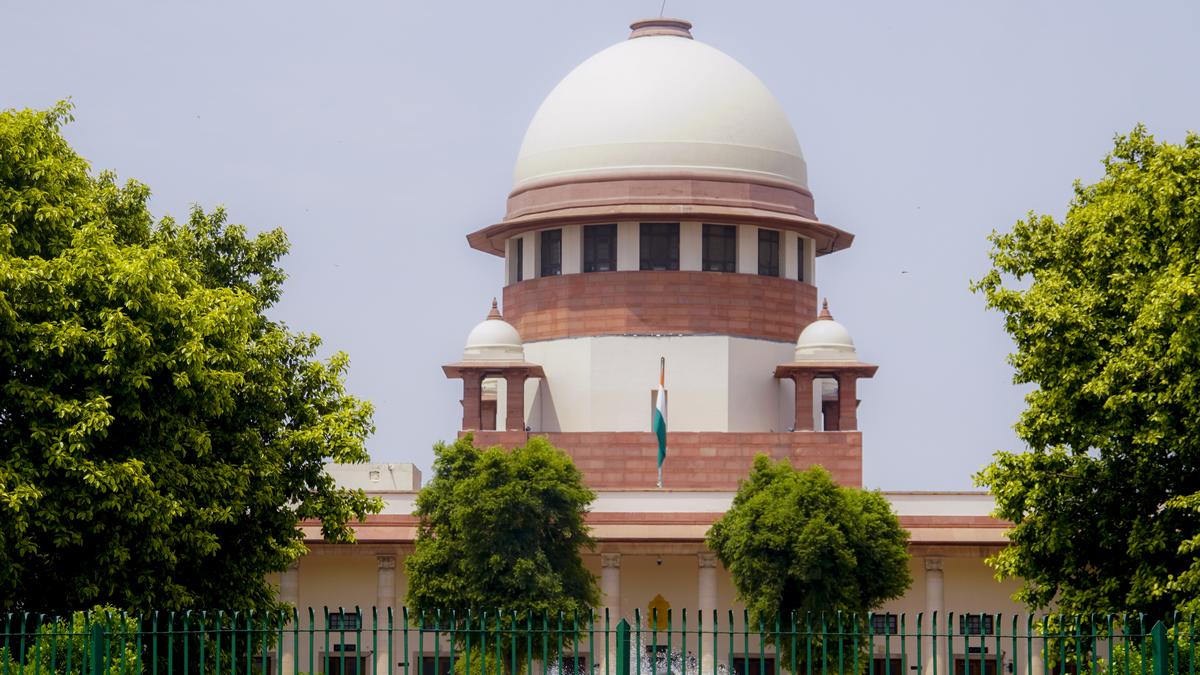Description

Copyright infringement not intended
Picture Courtesy: www.livelaw.in
Context: In a recent order, the Supreme Court of India made a significant decision regarding "self-respect" marriages under Section 7(A) of the Hindu Marriage Act, 1955.
Details
- In a recent development, the Supreme Court of India issued a significant ruling related to "self-respect" marriages and the role of advocates in solemnizing them under Section 7(A) of the Hindu Marriage Act, 1955.
Key points from the court ruling
- The Supreme Court allowed a petition that challenged a Madras High Court order. The Madras High Court had issued an order directing the initiation of disciplinary action against advocates who had conducted "self-respect" marriages in their offices and issued marriage certificates to consenting adults.
- The Supreme Court, in its ruling, emphasized that there is no blanket ban on advocates solemnizing "self-respect" marriages under Section 7(A) of the Hindu Marriage Act, 1955. This ruling effectively overturned a previous decision made by the Madras High Court in 2014.
- The Supreme Court specifically set aside the 2014 ruling of the Madras High Court, which had declared that marriages performed by advocates were not valid and had stated that "suyamariyathai" or "self-respect" marriages could not be solemnized in secrecy.
Significance of the ruling
- This Supreme Court ruling is significant as it clarifies the legal status of "self-respect" marriages and the role of advocates in conducting these ceremonies. It underscores that such marriages can be legally solemnized, and there is no inherent prohibition against advocates facilitating these marriages as long as they adhere to the legal requirements outlined in Section 7(A) of the Hindu Marriage Act.
- This decision has implications for the recognition and legality of "self-respect" marriages in the state of Tamil Nadu, where this specific provision of the Hindu Marriage Act applies.

What are 'Self-Respect' Marriages?
- "Self-respect" marriages, also known as "suyamariyathai" or "seerthiruththa marriages," are a type of marriage recognized under the Hindu Marriage Act with specific relevance to the state of Tamil Nadu in India.
Key characteristics of these marriages
- Legal Recognition: The concept of "self-respect" marriages was introduced through the Hindu Marriage (Tamil Nadu Amendment) Act, 1967. This amendment added Section 7-A to the Hindu Marriage Act of 1955, which applies exclusively to the state of Tamil Nadu.
- Inclusive Marriages: Section 7-A of the Hindu Marriage Act deals with "self-respect and secular marriages." It legally acknowledges marriages between any two Hindus, irrespective of their caste, creed, or background. These marriages are not limited by traditional social or religious boundaries.
- Solemnization: "Self-respect" marriages are solemnized straightforwardly and inclusively. They typically take place in the presence of relatives, friends, or any other individuals chosen by the couple. The core of the ceremony involves the mutual declaration of the parties as husband and wife. This declaration is made in a language understood by the couple, making it accessible to people of different linguistic backgrounds.
- Ceremonial Aspects: While "self-respect" marriages dispense with many traditional rituals, there are common ceremonial aspects. These may include the exchange of garlands, rings, or the tying of a "thali" (mangal sutra) as symbols of the marital union. These ceremonies are simplified compared to traditional Hindu weddings.
- Registration: One crucial requirement for "self-respect" marriages is that they must be registered in accordance with the law. Registration ensures the legal validity and recognition of the marriage.
- Rationale: The primary motivation behind the introduction of "self-respect" marriages in Tamil Nadu was to simplify the marriage process and make it more accessible. These marriages aim to eliminate the need for elaborate rituals, Brahmin priests, and traditional customs like the "saptapadi" (seven steps) typically associated with Hindu weddings. By doing so, they promote a more egalitarian and secular approach to marriage.
- Legal Status: The legal status of "self-respect" marriages is recognized under the Hindu Marriage Act, and they are valid and legally binding as long as they adhere to the requirements outlined in the Act, including registration.
Past Supreme Court Rulings on 'Self-Respect' Marriages
- In "S. Nagalingam vs Sivagami" (2001), the Supreme Court recognized the validity of a petitioner's marriage despite the absence of the "saptapadi" ceremony around the sacred fire.
- The Court clarified that the presence of a priest was not necessary for a valid marriage under Section 7-A of the Hindu Marriage Act (Tamil Nadu State Amendment). Parties could enter into marriage in the presence of relatives, friends, or others, with a simple ceremony involving garlanding, exchanging rings, or tying a thali.

Conclusion
- This recent Supreme Court decision clarifies the legal status of "self-respect" marriages in Tamil Nadu and upholds the validity of such marriages, even when solemnized by advocates, provided they adhere to the legal requirements outlined in the Hindu Marriage Act.
Must Read Articles:
SPECIAL MARRIAGE ACT: https://www.iasgyan.in/daily-current-affairs/special-marriage-act-6
MARRIAGE LAW FOR MINORS: https://www.iasgyan.in/daily-current-affairs/marriage-law-for-minors
SAME-SEX MARRIAGE IN INDIA: https://www.iasgyan.in/blogs/same-sex-marriage-in-india
|
PRACTICE QUESTION
Q. How does the rich diversity of cultural practices in India contribute to the country's identity and social fabric? What are the significant challenges faced in preserving and promoting this diversity and what strategies can be employed to ensure the continued celebration and safeguarding of India's cultural heritage?
|
https://indianexpress.com/article/explained/explained-law/self-respect-marriages-supreme-court-8914350/









